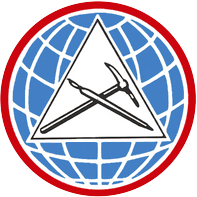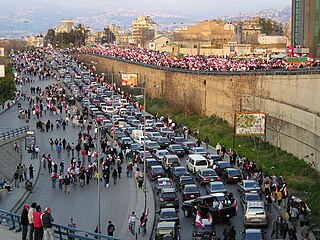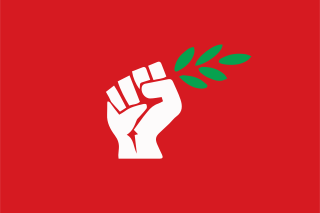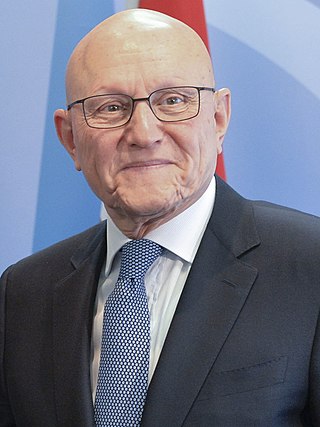Lebanon is a parliamentary democratic republic within the overall framework of confessionalism, a form of consociationalism in which the highest offices are proportionately reserved for representatives from certain religious communities. The constitution of Lebanon grants the people the right to change their government. However, from the mid-1970s until the parliamentary elections in 1992, the Lebanese Civil War (1975–1990) precluded the exercise of political rights.

The Progressive Socialist Party is a Lebanese political party. Its confessional base is in the Druze sect and its regional base is in Mount Lebanon Governorate, especially the Chouf District. Founded by Kamal Jumblatt in 1949, the party was led by his son Walid Jumblatt between 1977 and 25 May 2023. On 25 June 2023 the son of Walid, Taymur Jumblatt, was officially consecrated as leader of the PSP.

Michel Naim Aoun is a Lebanese politician and former general who served as the 13th president of Lebanon from 31 October 2016 to 30 October 2022.

The Cedar Revolution, also known as the Independence uprising, was a chain of demonstrations in Lebanon triggered by the assassination of former Lebanese Prime Minister Rafic Hariri. The popular movement was remarkable for its avoidance of violence, peaceful approach, and its total reliance on methods of civil resistance.

The Free Patriotic Movement is a Lebanese political party. Founded by Michel Aoun in 1994, the party is currently led by Aoun's son-in-law Gebran Bassil since 2015.

Saad El-Din Rafik Al-Hariri is a Lebanese businessman and retired politician who served as the prime minister of Lebanon from 2009 to 2011 and 2016 to 2020. The son of Rafic Hariri, he founded and has been leading the Future Movement party since 2007. He is seen as "the strongest figurehead" of the March 14 Alliance.

The Lebanese Forces is a Lebanese Christian-based political party and former militia during the Lebanese Civil War. It currently holds 19 of the 128 seats in Lebanon's parliament, being the largest party of the country.

Fouad Siniora is a Lebanese politician. He served as the 12th prime minister of Lebanon from 2005 to 2009. He served as minister of Finance from 2000 to 2004.

The Future Movement is a Lebanese political party affiliated with the Sunni sect. The party was founded as a coalition in 1995 led by Rafic Hariri which was known as the Hariri Bloc but was officially founded in 2007. The party is led by Saad Hariri.
Hezbollah originated within the Shiite block of Lebanese society. According to the CIA World Factbook estimate in 2022, Shiites comprise 31.2 percent of Lebanon's population, predominating in three areas of Lebanon: Southern Lebanon, Beirut and its environs (Dahieh), and the northern Beqaa valley region.
Along with the Amal Movement, Hezbollah is one of the two main parties representing the Shia community, Lebanon's largest religious bloc. Amal has made a commitment to carrying out its activities through political means, but remains a partial fighting force aiding Hezbollah when the need arises.

The March 14 Alliance, named after the date of the Cedar Revolution, was a coalition of political parties and independents in Lebanon formed in 2005 that were united by their anti-Assad regime stance and by their opposition to the March 8 Alliance. It was led by Saad Hariri, Walid Jumblatt and Samir Geagea, as well as other prominent figures.

The 2006–2008 Lebanese protests were a series of political protests and sit-ins in Lebanon that began on 1 December 2006, led by groups that opposed the US and Saudi-backed government of Prime Minister Fouad Siniora and ended on 21 May 2008 with the signing of the Doha Agreement. The opposition was made up of Hezbollah, Amal, and the Free Patriotic Movement (FPM); a number of smaller parties were also involved, including the Marada party, the Lebanese Communist Party and the Syrian Social Nationalist Party. A majority of the members of the government were part of the anti-Syrian March 14 Alliance, a coalition of political parties and independents in Lebanon. The two groups were also divided along religious lines, with most Sunnis and Druze supporting the government, and most Shi'a supporting the opposition. The Christian community was split between the two factions, with Michel Aoun, the leader of the FPM, claiming to have more than 70% support among the Christians, based on the results of the 2005 parliamentary election.
The March 8 Alliance is a loose coalition of political parties and independents in Lebanon formed in 2005 that are united by their pro-Ba'athist Syria stance and their opposition to the former March 14 Alliance. It was the ruling coalition in Lebanon with the government headed by Prime Minister Najib Mikati from June 2011 until March 2013. Main parties of the March 8 Alliance are part of the third Cabinet of Najib Mikati since 2021.
General elections were held in Lebanon between 18 August and 15 September 1996. Independent candidates won the majority of seats, although most of them were considered members of various blocs. Voter turnout was 43.3%.

The formation of a new government led by Najib Mikati follows five months of negotiations after the fall of the Saad Hariri government. Mikati formed a controversial 30-minister cabinet. Following ruptures and tensions and two previous threats to resign, Mikati finally resigned on 23 March 2013. Tammam Salam was tasked to form a new government on 6 April 2013.

General elections were held in Lebanon on 6 May 2018. Although originally scheduled for 2013, the election was postponed three times in 2013, 2014 and 2017 for various reasons, including the security situation, the failure of the Parliament to elect a new President, and the technical requirements of holding an election. A new electoral law adopted in 2017 provides a proportional representation system for the first time.

Tammam Saeb Salam is a Lebanese politician who was the Prime Minister of Lebanon from February 2014 until December 2016. He also served as the acting President of Lebanon from May 2014 until October 2016 in his capacity as prime minister. He previously served in the government of Lebanon as minister of culture from 2008 to 2009.
Osama Maarouf Saad, is a Lebanese politician, MP, and the leader of the Popular Nasserist Organization (PNO) movement allied with the Syrian government and Hezbollah, founded by his father Maarouf Saad, a leftist politician and mayor of Sidon whose violent assassination in 1975 helped spark the Lebanese Civil War.

General elections were held in Lebanon on 15 May 2022 to elect all 128 members of the Lebanese Parliament. The country has for several years been the subject of chronic political instability as well as a serious economic crisis aggravated by the 2020 explosions that hit the Port of Beirut and faced large-scale demonstrations against the political class.























